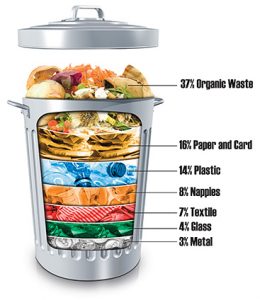Throughout this course, I have learned so much about how the food system correlates and intersects with politics and overall it was super interesting to learn about. Through my group’s action project on food waste, I have learned that the U.S “wastes, or loses, anywhere between 33 and 50% of all food that is produced annually (Carolan, 126). This is mainly because of industrialized food and how we can rapidly produce cheap food and thus it goes bad before it can be consumed. In terms of how much money the U.S. is losing, “the total value of food loss at retail and consumer levels in the U.S. is around $165.6 billion (Carolan, 126-127). Not only does food waste affect world hunger but it is also a huge loss financially. Beyond finances, food waste is detrimental to our environment. Because meat is among the top foods that is wasted, it represents 36% of diet-related GHG emissions and that is an egregious loss (Carolan, 127). Food waste contributes greatly to our carbon footprint and as we can see, it is a larger issue than many would believe and that is why my group decided to do an action project on food waste. We wanted to raise awareness about all the food wasted especially seeing how much food is wasted on our very own campus, the University of Washington. An interesting fact that I have learned about food waste in relation to the global food system is that food waste happens in every country but just at different stages. Affluent nations incur food losses at the consumer end while lower-income countries experience food lost prior to its arrival into people’s homes. Through systems theory, it is easy to see that our careless consumption and production of food has lasting detrimental economic and environmental effects. Our original plan for action was to host a panel focusing on food waste with bigger organizations that also focused on reducing food waste at the local level. People such as Imperfect Produce, Starbucks and our very own environmental professors. However, many of our panelists were unable to attend for many reason so instead we created an informative blog post to inform the public about food waste. Within the blog, we linked the Twitter’s of a couple of corporations that were most responsible for food waste and for people looking to take action, they can tweet at these companies in hopes to raise awareness to their carelessness in regards to food waste. Even though our group hit numerous obstacles and our main action plan fell apart, we were still somewhat successful in educating our community about the issues of food waste. It was a learning experience that I will never forget. While organizing social action is not easy, change has to start somewhere. Why not start with us?

